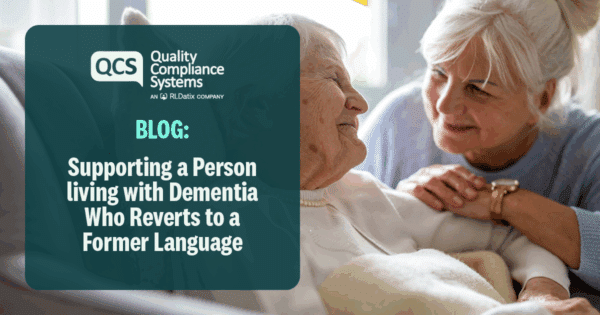Older people living with Dementia from culturally and linguistically diverse backgrounds, may encounter particular challenges in residential care.
As Dementia progresses, skills learned throughout life may be lost, particularly those more recently learnt. Sometimes the brain loses some of its ability to control and switch between languages, so a second language (especially if it has been acquired in adulthood) is, vulnerable to decline, and the person may begin to revert to their native tongue. This can be especially evident when they feel tired, unwell, or are anxious or distressed. Sometimes the person may mix up words from both languages, making what they say hard to follow in either language.
Communication barriers with staff and peers
If others around the person don’t share their native language, everyday conversation, and communication about needs, preferences, or health become increasingly difficult. Misunderstandings can lead to frustration, anxiety, and even to important care needs not being recognised or met.
Isolation and Risk
Where a person reverts to a former familiar language, research shows they may become lonely and isolated. To be in an environment where one is not understood can give rise to distress, anxiety or fear. It is important for providers to research and consider the provision of culturally appropriate social activities, when this occurs.
There is a danger that a service user’s attempts to communicate important information such as pain, or needing to use the toilet may not be understood. Staff may have to rely on non-verbal cues, which are sometimes ambiguous so important information may be missed. This could result in the service user suffering with untreated pain, or experiencing the distress of incontinence, for example.
It is important to remember that reverting to a first language can evoke memories and emotions, which may require sensitive approaches in daily care. Years ago, the author’s team faced a particular challenge when caring for a German Jewish Holocaust survivor. Dementia caused her to revert from English which she had used daily for decades, to a combination of German and Yiddish. There were no staff who could translate and no living family, so support was sought from a local volunteer network. Particular issues that arose included the re-emergence of highly traumatic memories such as starvation, traumatic loss of family members and flashbacks to the time of imprisonment in Auschwitz. An apparently unremarkable event, the slightly late arrival of a meal triggered survival behaviours, including hoarding food, and a heightened state of distressed vigilance. Caregivers were sometimes perceived as threatening presences, leaving the service user in a state of terror, which was deeply distressing for all concerned. In long term care, therefore, is crucial for staff to be aware of service users’ life history and be sensitive to key past events. Service users’ emotional states are real, must always be seriously and never be dismissed or assumed to be ‘just the Dementia’.
Reduce distress
It is important that staff remain self-aware, and avoid rushing, speaking quickly or showing any frustration they may be experiencing. It’s important to remember that a person living with Dementia does not lose the ability to ‘read body language’. This instinctive ability is stored deep in the base of the brain, and is not affected by Dementia. They can easily see when someone is frustrated or irritated, but may be unable to understand why, leading to unease and anxiousness.
Ten Top Tips
- Never correct or challenge the person for “switching” language – accept them as they are, right now
- Show warmth and reassurance through your tone of voice, smiles, touch (as appropriate) and body language
- Adapt how you communicate – keep words and sentences short and clear
- Use gestures, pictures, and objects to support understanding
- Even if you can’t understand the words the person uses, notice their tone of voice, facial expression and gestures – these can help you understand how the person is feeling
- Use available supports – for example, ask family for some common words and phrases in the person’s first language, and learn to use and recognise them
- Learn some simple phrases, and ask family to translate words the person frequently uses
- Encourage bilingual staff, relatives, or volunteers to help where possible
- Play songs, prayers, or recordings familiar to the person in their own language – this can help with them feel secure and relaxed
- Never raise your voice –as this can be construed as anger and may cause confusion and upset
- Document – make sure past and present languages spoken by the person are recorded, and note some useful words or phrases staff can use in daily care
Make sure words and phrases are shared with the care team, so that everyone can support with consistent communication.
Don’t forget that staff in other roles, such as housekeeping and maintenance are also a part of your residential care community. They may be able to offer support and create positive interactions the person can understand and enjoy.
Key Phrases to Learn
Greetings and Connection
- Hello/Good morning/Good evening/Good night
- How are you?
- My name is …
- It’s nice to see you
Comfort and Reassurance
- Don’t worry/It’s okay/You’re safe
- Can I help you?
- I am here with you
- You are not alone
Daily Care
- Are you hungry?
- Are you thirsty?
- Do you need the toilet?
- Are you tired?/Would you like to rest now?
Choices and Encouragement
- Yes/No
- Do you want this… or that?
- Very good/Well done
- Thank you
Emotional Support
- Everything is alright
- We will do this together
- I’m your friend
- Your family loves you
- Your family is coming soon* (* Use only when you know this to be true)
Work with the person’s family or friends to choose useful words and phrases in the person’s first language.
Stick to short, familiar, positive phrases rather than full sentences.
Write the words phonetically, so other staff can learn how to pronounce them. Share this with them, so that there is a consistent response from the team to support the person’s wellbeing and security.
Always pair the words with smiles, gestures, or pictures for clarity.
Most Importantly-
In person-centred care, CONNECTION IS MORE IMPORTANT THAN PERFECTION.
Communication is not just through words, so achieving it is always possible, even when there are barriers in language and cognition. It is your warm presence, kindness, and patience that matter most. Taking a person’s hand and spending a moment with them can provide reassurance and help them to feel safe. Even without words, kindness, understanding and a few moments spent together can often bridge the gap.
Download Factsheet




